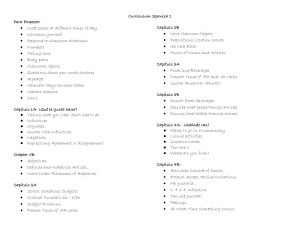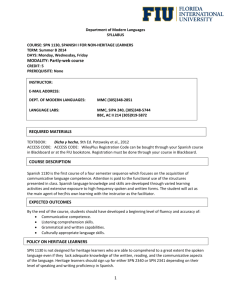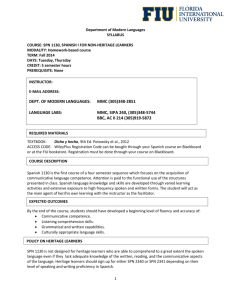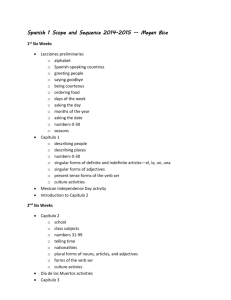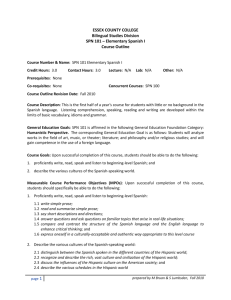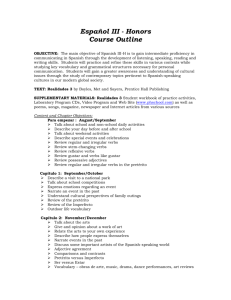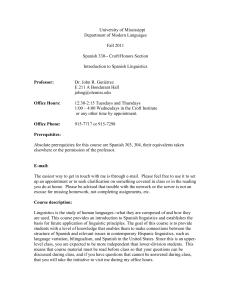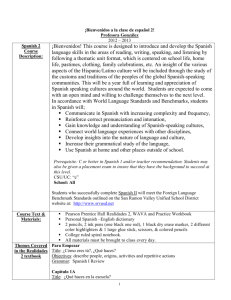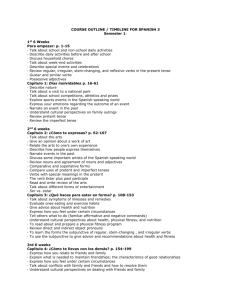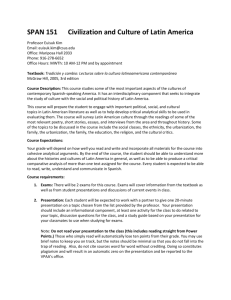Syllabus - Department of Modern Languages
advertisement
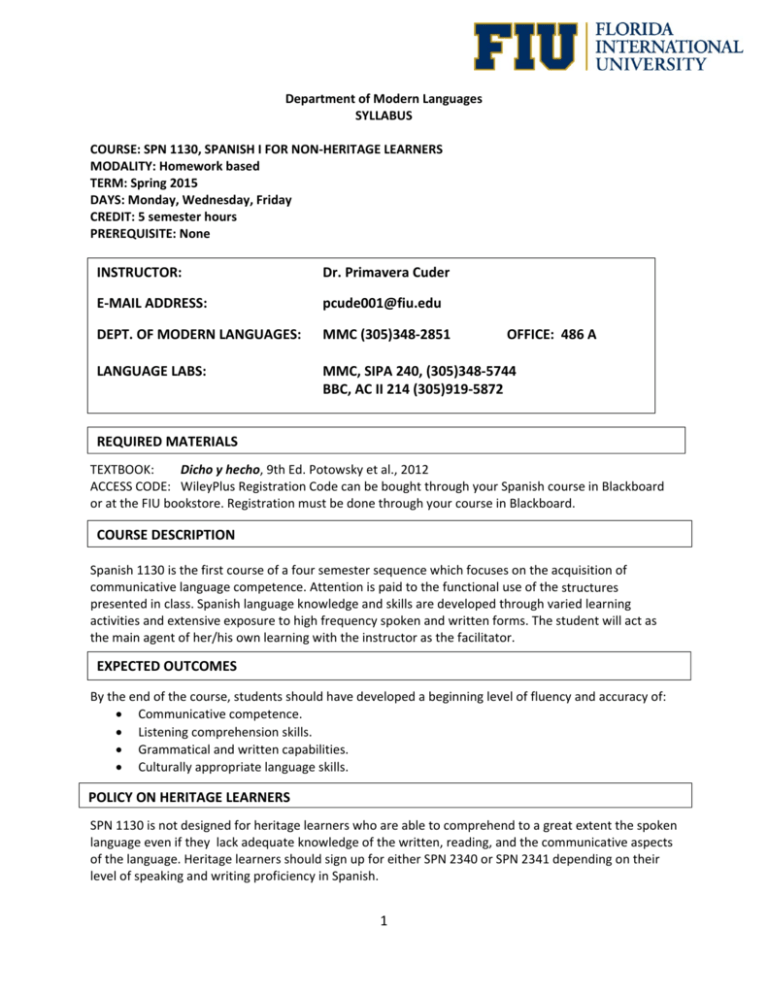
Department of Modern Languages SYLLABUS COURSE: SPN 1130, SPANISH I FOR NON‐HERITAGE LEARNERS MODALITY: Homework based TERM: Spring 2015 DAYS: Monday, Wednesday, Friday CREDIT: 5 semester hours PREREQUISITE: None INSTRUCTOR: Dr. Primavera Cuder E‐MAIL ADDRESS: pcude001@fiu.edu OFFICE: 486 A DEPT. OF MODERN LANGUAGES: MMC (305)348‐2851 LANGUAGE LABS: MMC, SIPA 240, (305)348‐5744 BBC, AC II 214 (305)919‐5872 REQUIRED MATERIALS TEXTBOOK: Dicho y hecho, 9th Ed. Potowsky et al., 2012 ACCESS CODE: WileyPlus Registration Code can be bought through your Spanish course in Blackboard or at the FIU bookstore. Registration must be done through your course in Blackboard. COURSE DESCRIPTION Spanish 1130 is the first course of a four semester sequence which focuses on the acquisition of communicative language competence. Attention is paid to the functional use of the structures presented in class. Spanish language knowledge and skills are developed through varied learning activities and extensive exposure to high frequency spoken and written forms. The student will act as the main agent of her/his own learning with the instructor as the facilitator. EXPECTED OUTCOMES By the end of the course, students should have developed a beginning level of fluency and accuracy of: Communicative competence. Listening comprehension skills. Grammatical and written capabilities. Culturally appropriate language skills. POLICY ON HERITAGE LEARNERS SPN 1130 is not designed for heritage learners who are able to comprehend to a great extent the spoken language even if they lack adequate knowledge of the written, reading, and the communicative aspects of the language. Heritage learners should sign up for either SPN 2340 or SPN 2341 depending on their level of speaking and writing proficiency in Spanish. 1 A placement test will be administered on the first day of classes. Any heritage learner who enrolls in a course for non‐heritage learners will be obligated to switch to a heritage language course during the first week of class. Any student who does not attend the first day of class will be administratively dropped. COURSE EVALUATION ATTENDANCE AND PARTICIPATION HOMEWORK (WILEYPLUS) PARTIAL EXAMS (2) COMPOSITIONS (3) VIDEO PROJECT ORAL EXAM FINAL EXAM 15% 20% 15% 10% 10% 10 % 20% GRADE SCALE A A ‐ B + B B ‐ C + 100‐93.0 92.9‐90.0 89.9‐88.0 87.9‐83.0 82.9‐80.0 79.9‐78.0 C C ‐ D + D D ‐ F 77.9‐73.0 72.9‐70.0 69.9‐68.0 67.9‐63.0 62.9‐60.0 59.9‐BELOW ATTENDANCE AND PARTICIPATION (15%): Students are expected to attend class regularly and to come to class prepared and ready to participate actively. Instructors may have pop quizzes as deemed necessary. Each week, your instructor will evaluate your participation level and you will have the opportunity to earn 5 points for every class if you arrive for class on time, speak in Spanish during the whole class and in group discussions and participate in all activities with enthusiasm and a positive attitude. Tardiness is disruptive to the class; therefore, students should be on time for class. Attendance will be taken at the beginning of each class period. At least 2 points may be deducted if the student is not present when his/her name is called. The instructor has the prerogative to deny admission to those who arrive more than 10 minutes late. A student will automatically receive a grade of F as the final grade for the course if the student is absent from 40% (or more) of the total number of classes for the semester. NOTE: In order to maintain an environment conducive to learning, students are asked to turn off or silence Smart phones, Ipods and all electronic devices before entering the classroom. Instructors reserve the right to ask the student to leave the classroom if they disturb the class with any of these devices. HOMEWORK (20%): Students are responsible for reading, prior to class, the textbook pages containing the explanations of the grammatical points to be used and practiced during the in‐class activities. 2 Students will complete the homework exercises (listening, reading, grammar) in Blackboard/WileyPlus by the due date. PARTIAL EXAMS (15%): There will be two in‐class partial exams. The PE 1 will cover chapters 1, 2 and the PE 2 will cover 3, 4. These exams will consist of the following sections: listening comprehension, vocabulary, grammar, and culture. The dates of the exams are indicated in the course calendar below. No make‐ups will be given without a documented and valid reason. COMPOSITIONS (10%): You will be required to write in class a total of 3 compositions in Spanish on a topic assigned by your instructor on the date indicated by him/her. VIDEO PROJECT (10%): Each group (of 3 or 4) will do a video (no more than 10‐15 minutes) in Spanish about a topic such as Hispanic food, Hispanic customs and traditions or other related topics with instructor’s permission. Topics may, for example, include autobiographical speeches, your university life or how‐to demonstrations. Students should come up with creative ideas that maintain the audience’s attention. Videos will be shown in class. Your instructor will provide you with more information on the project. ORAL EXAM (10%): The exam will take place during class time the week before the last week of classes. The exam will consist of a role‐play/interview with another classmate for around 2‐3 min. You will be given 1‐2 minutes to think about the topic given, after which time you will have to perform the task in front of your instructor. You will not be able to have any notes. You will be graded on your fluency, your grammatical accuracy and your breadth of vocabulary. No make‐ups will be given without a documented and valid reason. FINAL EXAM (20%): The final exam will be comprehensive and will be given in class during the Final Exam Week. No make‐ups will be given without a documented and valid reason. STUDENT RESPONSIBILITIES INCOMPLETE GRADE: A grade of “I” is only given when there is a valid, documented reason, which prevents the student from completing the course. A student should have completed at least 60% of the course work in order to get an Incomplete grade. If such reason arises, please advise your instructor immediately, and make arrangements for removing the Incomplete as soon as possible. ACADEMIC DISHONESTY: All course work must be the work of the student; otherwise, it is considered cheating. Plagiarism, cheating, and forgery are serious offenses and will not be tolerated as stated in the Academic Misconduct section of FIU’s Academic Affairs Policies, Manuals, and Handbooks. STUDENTS WITH DISABILITY: It is the responsibility of any student with a disability who requests a reasonable accommodation to contact the Disability Resource Center (DRC). DRC will then contact the instructor so that a reasonable accommodation can be made. IMPORTANT DATES January 20: Last day to drop/withdraw courses without incurring a financial liability. February 6: Last day to drop/withdraw courses with a 25% refund of tuition. March 23: Last day to drop/withdraw courses with a DR/WI grade. May 7: Grades available to students by web and kiosks. 3 COURSE CALENDAR WEEK 1: JAN 12 – 18 DAY 1: Introduction to the course: going over the syllabus and giving instructions of how to register for WileyPlus/Bb. Capítulo 1: Nuevos encuentros Lesson goals: Introducing oneself and others, greetings and goodbyes. Las presentaciones, saludos y despedidas, ¿cómo estás?, expresiones de cortesía, p. 4 DAY 2: Capítulo 1: Nuevos encuentros Lesson goals: Introducing oneself and others, greetings and goodbyes. (Cont.) Las presentaciones, saludos y despedidas, ¿cómo estás?, expresiones de cortesía, p. 4 Cultura: Greetings, p. 11 DAY 3: Capítulo 1: Nuevos encuentros Lesson goals: Identify and describe people. Subject pronouns and the verb SER, p. 12 Los cognados, p. 13 WEEK 2: JAN 19 – 25 DAY 1: MARTIN LUTHER KING HOLIDAY. NO CLASS. DAY 2: Capítulo 1: Nuevos encuentros Lesson goals: Learning the letters of the alphabet. El alfabeto, p.18 Communicative activities DAY 3: Capítulo 1: Nuevos encuentros Lesson goals: Using numbers. Learning the days of the week and the months of the year. Los números del 0 al 99, p. 16 Los días de la semana y los meses del año, p.20 WEEK 3: JAN 26 – FEB 1 DAY 1: Capítulo 1: Nuevos encuentros Lesson goals: Communicative activities DAY 2: Capítulo 1: Nuevos encuentros Lesson goals: Tell time. Hispanic nationalities Decir la hora, p. 25 Las nacionalidades, p. 28 DAY 3: Capítulo 1: Nuevos encuentros Lesson goals: Communicative activities WEEK 4: FEB 2 – 8 DAY 1: Capítulo 2: La vida universitaria Lesson goals: Identifying objects and persons, gender and number: Nouns and articles 4 La vida universitaria, p. 34 Nombres y artículos, p. 37 DAY 2: Capítulo 2: La vida universitaria Lesson goals: Learning about the academic life. Talking about going places. El campus universitario, p. 41 Ir + a + destination, p. 43 DAY 3: Capítulo 2: La vida universitaria Lesson goals: Communicative activities WEEK 5: FEB 9 – 15 DAY 1: Capítulo 2: La vida universitaria Lesson goals: Talking about actions in the present. Verbos regulares en – ar, p. 51 DAY 2: Capítulo 2: La vida universitaria Lesson goals: Talking about actions in the present. Verbos regulares en – er and ‐ ir, p. 56 DAY 3: Capítulo 2: La vida universitaria Lesson goals: Communicative and/or cultural activities WEEK 6: FEB 16 – 22 DAY 1: Partial Exam 1 (in class). It will cover chapters 1 and 2. Capítulo 3: Así es mi familia Lesson goals: Talk about the family. Así es mi familia, p. 68 DAY 2: Capítulo 3: Así es mi familia Lesson goals: Telling one’s age. Describing people and things. Tener y tener...años, p. 72 Adjetivos descriptivos con SER, p. 76 DAY 3: Capítulo 3: Así es mi familia Lesson goals: Communicative activities WEEK 7: FEB 23 – MARCH 1 DAY 1: Capítulo 3: Así es mi familia Lesson goals: Indicating possession. Adjetivos posesivos, p.84 DAY 2: Capítulo 3: Así es mi familia Lesson goals: Indicating location and describing conditions. El verbo ESTAR, p. 87 5 DAY 3: Capítulo 3: Así es mi familia Lesson goals: Communicative and/or cultural activities WEEK 8: MARCH 2 – 8 DAY 1: : Capítulo 4: ¡A la mesa! Lesson goals: Buy and talk about food in a market, restaurant, etc. Expressing likes and dislikes. ¡A la mesa!, p. 102 El verbo GUSTAR, p. 108 DAY 2: Capítulo 4: ¡A la mesa! Lesson goals: Talking about actions, desires, and preferences. Verbos irregulares, p. 117 DAY 3: Capítulo 4: ¡A la mesa! Lesson goals: Communicative activities. WEEK 9: MARCH 9 – 15 SPRING BREAK WEEK 10: MARCH 16 – 22 DAY 1: Capítulo 4: ¡A la mesa! Lesson goals: Capítulo 4: ¡A la mesa! Communicative activities (optional: Para leer, Para escribir, Cultura) DAY 2: Capítulo 4: ¡A la mesa! Lesson goals: Meals and drinks. Las comidas y las bebidas, p. 120 DAY 3: Capítulo 4: ¡A la mesa! Lesson goals: Numbers and indicating the year. Los números a partir de 100 y el año, p. 126 WEEK 11: MARCH 23 – 29 DAY 1: Capítulo 4: ¡A la mesa! Lesson goals: Asking for specific information. Palabras interrogativas, p. 130 DAY 2: Capítulo 4: ¡A la mesa! Communicative activities (optional: Para leer, Para escribir, Cultura) DAY 3: Partial Exam 2 (in class). It will cover chapters 3 and 4. WEEK 12: MARCH 30 – APRIL 5 6 DAY 1: Capítulo 5: Recreaciones y pasatiempos Lesson goals: Talk about hobbies, pastimes, and activities. Recreaciones y pasatiempos, p. 142 DAY 2: Capítulo 5: Recreaciones y pasatiempos Lesson goals: Talking about activities in the present. Los verbos SABER y CONOCER, p. 152 DAY 3: Capítulo 5: Recreaciones y pasatiempos Lesson goals: Talking about activities in the present. Verbos irregulares en YO y otros verbos irregulares, p. 155 WEEK 13: APRIL 6 – 12 DAY 1: Capítulo 5: Recreaciones y pasatiempos Lesson goals: Expressing preferences, obligations, and intentions. Expresiones: Tener ganas de+infinitivo…tener que+infinitivo…pensar+infinitivo…, p. 158 DAY 2: Capítulo 5: Recreaciones y pasatiempos Lesson goals: Making future plans. Learning about the weather and the seasons. Ir + a + infinitivo, p. 160 El tiempo y las estaciones, p. 163 DAY 3: Capítulo 5: Recreaciones y pasatiempos Lesson goals: Emphasizing that an action is in progress. Presente progresivo, p. 167 WEEK 14: APRIL 13 – 19 DAY 1: Capítulo 5: Recreaciones y pasatiempos Lesson goals: Describing people, places and things. Los verbos SER y ESTAR (resumen), p. 169 DAY 2: Capítulo 5: Recreaciones y pasatiempos Lesson goals: Communicative and/or cultural activities DAY 3: Review for Final Exam DAY 1: Review for Final Exam WEEK 15: APRIL 20– 26 ORAL EXAM WEEK WEEK 16: APRIL 27 – MAY 1 FINAL EXAM WEEK SUMMARY OF DEADLINES All activities are due by 11:00 PM EST on the dates indicated. 7 WILEYPLUS HOMEWORK THROUGH BLACKBOARD: Lesson 1: FEBRUARY 1 Lesson 2: FEBRUARY 15 Lesson 3: MARCH 1 Lesson 4: MARCH 29 Lesson 5: APRIL 19 IN‐CLASS PARTIAL EXAMS: Partial Exam 1: FEBRUARY 16 Partial Exam 2: MARCH 27 8
